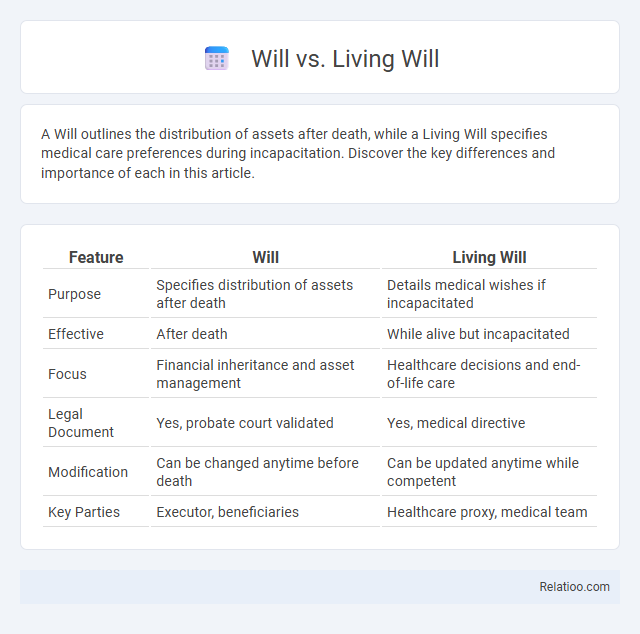A Will outlines the distribution of assets after death, while a Living Will specifies medical care preferences during incapacitation. Discover the key differences and importance of each in this article.
Table of Comparison
| Feature | Will | Living Will |
|---|---|---|
| Purpose | Specifies distribution of assets after death | Details medical wishes if incapacitated |
| Effective | After death | While alive but incapacitated |
| Focus | Financial inheritance and asset management | Healthcare decisions and end-of-life care |
| Legal Document | Yes, probate court validated | Yes, medical directive |
| Modification | Can be changed anytime before death | Can be updated anytime while competent |
| Key Parties | Executor, beneficiaries | Healthcare proxy, medical team |
Understanding the Basics: Will vs Living Will
A Will is a legal document that outlines how a person's assets and property will be distributed after their death, ensuring their wishes are honored. A Living Will, also known as an advance directive, specifies medical treatment preferences if an individual becomes incapacitated and unable to communicate decisions. Understanding the difference between a Will and a Living Will is essential for comprehensive estate and healthcare planning.
Key Differences Between a Will and a Living Will
A will is a legal document that outlines the distribution of assets and guardianship after death, while a living will specifies medical treatment preferences in case of incapacitation. A living will takes effect during a person's lifetime when they cannot communicate healthcare decisions, unlike a will, which is enacted after death. Key differences include their purpose--asset distribution versus healthcare directives--and the timing of their activation, with the will addressing post-mortem matters and the living will focusing on end-of-life care choices.
Primary Purposes of a Will
A Will primarily serves to distribute your assets and property after your death, ensuring your wishes are legally honored. A Living Will outlines your healthcare preferences should you become incapacitated and unable to communicate. Your Will focuses on estate planning, while a Living Will addresses medical decisions during your lifetime.
Main Functions of a Living Will
A living will primarily functions to provide clear instructions about a person's medical care preferences in situations where they are unable to communicate, ensuring their wishes regarding life-sustaining treatments are respected. Unlike a traditional will, which distributes assets after death, and a general will that outlines broader intentions, the living will specifically addresses end-of-life healthcare decisions. This legal document guides healthcare providers and family members to prevent unwanted interventions and reduce confusion during critical moments.
Legal Requirements for Creating a Will
Creating a valid will requires meeting specific legal requirements such as being of sound mind, having legal age (usually 18 or older), and clearly outlining asset distribution. Your will must be written, signed by you, and witnessed by at least two impartial individuals to ensure its enforceability in court. Unlike living wills, which express healthcare preferences, or trusts, which manage assets, a traditional will specifically addresses property distribution after death under state laws.
Legal Criteria for Drafting a Living Will
A Living Will must adhere to strict legal criteria, including clear, written documentation of medical treatment preferences in cases of incapacitation, often requiring notarization or witness signatures to validate its authenticity. Unlike a traditional Last Will and Testament that addresses asset distribution after death, the Living Will specifically directs healthcare decisions based on legal statutes varying by jurisdiction. Ensuring compliance with state-specific laws on capacity, revocation, and scope of medical directives is essential for the Living Will's enforceability in medical and legal settings.
Choosing Executors and Healthcare Proxies
Choosing the right executor for your will ensures your assets are managed and distributed according to your wishes, while a living will appoints a healthcare proxy to make medical decisions if you're incapacitated. Executors handle financial and legal responsibilities after your death, whereas healthcare proxies make critical health-related choices during your lifetime. Clarifying these roles in your estate and healthcare documents protects your interests and provides peace of mind for you and your loved ones.
When to Update Your Will or Living Will
Update your will or living will after major life events such as marriage, divorce, the birth of a child, or significant changes in financial status to ensure your wishes are accurately reflected. Regular reviews every three to five years help accommodate changes in laws or personal preferences regarding asset distribution or healthcare decisions. Failure to update these documents may result in unintended asset allocation or medical interventions not aligned with your current desires.
Common Misconceptions About Wills and Living Wills
Many people mistakenly believe that a will and a living will serve the same purpose, but a will primarily addresses the distribution of assets after death, while a living will outlines medical preferences if one becomes incapacitated. Another common misconception is that a living will can appoint a healthcare proxy, though that often requires a separate document called a healthcare power of attorney. Understanding these distinctions ensures proper estate planning and medical directive execution.
Importance of Having Both Documents in Place
A Will outlines the distribution of assets after death, ensuring beneficiaries receive their intended inheritance, while a Living Will specifies medical preferences if one becomes incapacitated. Having both documents in place ensures comprehensive estate planning, covering both financial wishes and healthcare decisions. This dual approach prevents legal disputes and provides clear guidance to loved ones during difficult times.

Infographic: Will vs Living Will
 relatioo.com
relatioo.com